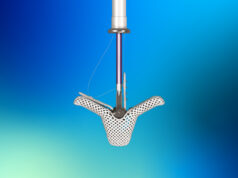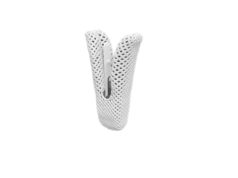
Abbott has initiated a pivotal clinical study in the USA of its Tendyne transcatheter mitral valve implantation (TMVI) system for the treatment of mitral regurgitation. The trial will evaluate the safety and efficacy of the treatment in patients suffering from mitral regurgitation. The investigational Tendyne device, according to a press release, is the first and only mitral valve replacement that can be repositioned and fully retrieved, allowing the surgeon to precisely place the device during implantation, which could improve patient outcomes.
The study, called SUMMIT, will enrol up to 1,010 patients at 80 sites in the USA, EU and Canada to evaluate if treatment with the Tendyne TMVI system is safe and effective for patients suffering from severe mitral regurgitation. Jason Rogers (UC Davis Medical Center, Sacramento, USA) and Gorav Ailawadi (University of Virginia, Charlottesville, USA) are co-principal investigators of the study, which will evaluate a composite endpoint of death, cardiovascular hospitalisation, stroke or reoperation at one year. The first several patients in the trial were treated at Ascension’s Via Christi Hospital St Francis in Wichita (USA) and the West Virginia University Heart and Vascular Institute in Morgantown (USA).
The press release reports that the Tendyne valve may provide a life-saving treatment option for mitral regurgitation patients by replacing their native mitral valve without open-heart surgery to reduce their heart failure symptoms. The device is a tri-leaflet, bioprosthetic valve available in multiple sizes, and is stabilised by a pad and a tether mechanism that holds the pad in place where it’s been implanted inside the native valve. As the first and only repositionable and fully retrievable replacement valve, Tendyne has been designed to conform to a broad range of anatomies, which may allow for better outcomes and procedural ease-of-use.
Bassem M Chehab (Ascension’s Via Christi Hospital St Francis, Wichita, USA), who implanted the first patient in the study with the Tendyne valve, comments: “The mitral valve is known for its complex anatomy and, as a result, managing mitral regurgitation can be challenging, especially in elderly or frail patients for whom there are limited to no treatment options. I am encouraged by promising early results from the global study and excited about the potential for the Tendyne device to advance the field of transcatheter mitral valve replacement in the USA by providing another option for MR patients needing a minimally invasive alternative.”
Abbott recently shared data at EuroPCR 2018 that showed positive results from the first 100 patients treated in a global study of the Tendyne device. Results showed that, at 30 days, patients treated with Tendyne had a significant reduction in symptoms of mitral regurgitation and low mortality rates.
“Transcatheter mitral valve replacement [implantation] represents a new frontier in treating people whose valve does not close properly and who would benefit from a replacement valve instead of repair. Abbott established the market for minimally invasive mitral valve repair with MitraClip, showing the safety and viability of a non-surgical repair and paving the way for other catheter-based devices to treat structural heart diseases. Our scientists and engineers are building on our expertise to advance transcatheter mitral valve replacement with our Tendyne technology to provide a needed treatment option,” comments Michael Dale, vice president of Abbott’s structural heart business.
In addition to the US pivotal trial, Abbott will initiate a separate feasibility study of the Tendyne system in patients with severe mitral annular calcification.













